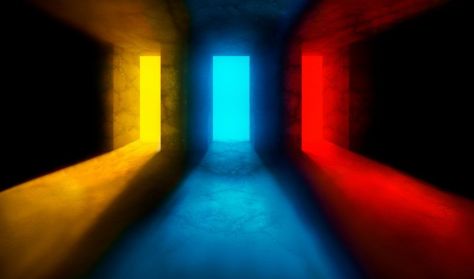
Andrea Chénier
Opera in two parts, four acts, in Italian, with Hungarian and English surtitles

Opera in two parts, four acts, in Italian, with Hungarian and English surtitles
Ön egy múltbeli eseményre keresett rá. Kérjük, válogasson aktuális kínálatunkból a Jegy.hu keresőjében!
Last event date: Thursday, June 23 2022 7:00PM
“The revolution has no need for poets!” Supposedly these were the public prosecutor’s closing words when the Revolutionary Tribunal condemned Andrea Chénier to death during the bloodiest period of the French Revolution. In Umberto Giordano’s work, Chénier’s fate transcends actual events and becomes the story of a tragic love triangle in which the lives of the protagonists are subjected to the forces of history, betrayal and amorous passion.
Giordano’s music perfectly captures the atmosphere of Paris both before and during the French Revolution. Along with presenting elegant aristocratic dances and popular revolutionary songs, such as La Marseillaise, he also endows the main characters with melodies of irresistible beauty.
AUTHORS
Artistic director and director-choreographer Balázs Vincze is very familiar with the tastes of dance aficionados partial to the traditions of bourgeois theatre and is superb at adapting familiar and popular literary classics to the dance stage. His wonderful sense of proportion enables audiences to follow plots in the language of dance. His contemporary choreographies built on classical foundations are unique, spectacular and of a high professional calibre without losing sight of the need to please the audience.
19:00 Kapunyitás 20:00 Beton.Hofi 22:00 Krúbi Beton.Hofi Rap Artist Krúbi háromszoros Fonogram-díjas énekes, rapper, zeneszerző, szövegíró. Első dalában, a 2017 nyár elején megjelent PestiEst-ben csak úgy sorjáznak a tabutémák, ám a kifejezetten harcos kiállása, a teljesen újszerű rímképlet és a hitelesség azonnal feltűnést keltett. A bemutatkozó nagylemezén (Nehézlábérzés, 2018) Krúbi teljes fegyverzetében jelenik meg: erőteljes politizálás, szexualitás, celebek bírálata, tabudöntögető témák. A 2019-es Zárolás feloldva EP dalait a gyors befutás hátulütői, az agresszíven nyomuló rajongók, a tolakodó nők, az eredményt váró menedzserek népesítik be. A korábbinál egységesebb, komorabb hangvételű második album után 2020 augusztusától Krúbi szívizomgyulladás miatt csaknem tíz hónapig nem állt színpadra, de 2021 nyarán újra nagy sikerrel zenélt. A betegségéről szóló csaknem kilenc perces Szív című dal hamar népszerű lett. Legutóbbi, III. Krúbi című albumát éppen 29. születésnapján, 2023. november 17-én dobta piacra, többek között a Ganxsta Zolee tehet mindenről című szerzeménnyel. A korong dalait 2024 januárjában a Papp László Sportarénában tartott nagyszabású koncertjén hallgathatták meg élőben a rajongói. Beton.Hofi szabályosan berobbant a hazai újhullámos hiphop világába. A 2021 júniusában megjelent első, ‘comic sins’ c. mixtape óriási kritikai és közönség sikert aratott, a 2022-ben kiadott ‘Playbánia’ megjelenését követően, pedig egyértelművé vált, hogy Beton.Hofi az elkövetkezendő évek meghatározó könnyűzenei előadója lesz. Egyedi hangzásvilágával, (ön)reflektív dalszövegeivel, hipnotikus színpadi jelenlétével, humorával és lelkes, magukat ‘Citromale Gang’ néven aposztrofáló rajongói bázisával gyorsan, mindössze 2 év alatt bebiztosította helyét a klubok és fesztiválok nagyszínpadain, hogy aztán 2023-ban már a telt-házas Budapest Parkban lépjen fel. 2022-ben a ‘comic sins’-ért, 2023-ban pedig a Playbánia albumért Fonogram díjat nyert az év hazai rap vagy hip-hop albuma/ hangfelvétele kategóriában, Hundred Sins-el közös Bagira c. dala, pedig a 3. legtöbbet játszott magyar dal lett valaha Spotifyon. A trilógiát záró “0” c. 20 dalos lemeze 2024 tavaszán jelent meg. A lemezt áprilisban, első “aréna showján” az MVM Dome-ban mutatja be. Super Early Bird: 6500 Ft (korlátozott darabszámban) Early Bird: 7500 Ft (korlátozott darabszámban) Standard: 8500 Ft VIP: 12000 Ft (korlátozott darabszámban) VIP jegy tartalma: gyors belépés a VIP bejáraton keresztül, a koncertet közvetlenül a színpad előtt egy elkülönített nézőtéri helyről élvezheted, egyedi VIP pass és karszalag, welcome drink
„Hegedűs a háztetőn… valahol mind azok vagyunk. Megpróbálunk egy letisztult dallamot kicsalni, miközben egyensúlyozunk, hogy ne szegjük nyakunkat. Nem könnyű!”
Kukorica Jancsi és Iluska megindító szerelmi története, a csodás, magyar népmesei motívumokban bővelkedő daljáték, mely híven követi az eredeti művet…
Janikovszky – lánykori nevén Kucses – Éva tizenkét és tizennyolc éves kora között, 1938-tól 1944-ig vezette a naplóját. Negyedik naplófüzetének…
item(s) in basket
total:
Time limit has expired. Please, put item(s) in to basket again.